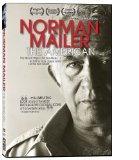| Reviews & Columns |
|
Reviews DVD TV on DVD Blu-ray 4K UHD International DVDs In Theaters Reviews by Studio Video Games Features Collector Series DVDs Easter Egg Database Interviews DVD Talk Radio Feature Articles Columns Anime Talk DVD Savant Horror DVDs The M.O.D. Squad Art House HD Talk Silent DVD
|
DVD Talk Forum |
|
|
| Resources |
|
DVD Price Search Customer Service #'s RCE Info Links |
|
Columns
|
|
|
Norman Mailer: The American
THE MOVIE:
There is a great documentary to be made on the life of Norman Mailer: legendary writer, famed raconteur, failed politician, occasional filmmaker, notorious womanizer, renowned drinker. That great documentary has yet to be made; Joseph Mantegna's Norman Mailer: The American, put politely, is not it. Shabbily assembled and glancingly shallow, this brief 2010 portrait offers some bracing footage and tantalizing ideas, but either the subject is too immense, or the filmmaker was simply unable to lick him.
After a trailer-style prologue setting up his life and achievements, the film catches up with Mailer in Provincetown, Massachusetts, circa 2006. He's unapologetic and candid ("I'm too old to sell myself"), and from there Mantenga jumps back to the writer's childhood. There is no narration--Mailer provides much of it himself via interviews, and his biographers help considerably--and the picture's zippy pace is established right off the bat. His childhood is mostly skimmed over (save one key insight from his second wife Adele: "The only woman he was ever married to was his mother"), and he's writing The Naked and the Dead by the nine-minute mark.
In most documentaries, the get-to-the-point approach to childhood is one this viewer welcomes; there's nothing less interesting than getting bogged down in the details of how great-grandparents met. But the trouble is, that Wikipedia-deep approach follows suit throughout the film. His mayoral campaign, a story fascinating enough to warrant a documentary of its own, gets something like three minutes of screen time; the fascinating scandal surrounding his lobbying for the parole of Jack Abbott (a convict with literary gifts who committed a murder six weeks after his release) gets similarly short shrift.
Some episodes are given proper weight. As with the cinematic work of Andy Warhol, Mailer's film output is more interesting to view in documentary than original form, and we see exactly as much of it as can probably be stomached--a few clips, a lengthy excerpt from the still-alarming unstaged fight between Mailer and Rip Torn, and the ever-popular "Oh man! Oh God" moment from Tough Guys Don't Dance. The material delving into questions and theories about his possibly fluid sexuality is compelling, and Mantegna wisely turns over several minutes to his riveting argument with Gore Vidal on The Dick Cavett Show, letting Vidal have his seemingly valid say about the more troublesome aspects of Mailer's personality and persona (he comes off particularly badly in these years, like a bullying, drunken boor). And his fascinating love letters to second wife Adele are vividly offset by the gripping account of when he stabbed her at a party; she recalls it in detail, while Mailer discusses it briefly before pulling back. "More than that I wouldn't care to get into," he says.
But even that harrowing section is undercut by odd editing and directorial choices. The idea of cross-cutting the stabbing story with a bull fight, for example, probably plays better in theory than it does in practice, and the choices of stock footage inserts range from poorly chosen (an old stag film as a second-hand acquaintance insists "They were very in to role-playing; I'm sure they did a lot of S&M stuff too") to downright inexplicable (a rocket lifting off as Mailer is called a rock star). Maybe the idea is stylization or fast pace; whatever the reasoning, it doesn't land.
THE DVD:
Video & Audio:
Technical elements are underwhelming at best. The anamorphic widescreen image is often at the mercy of sketchy source materials--low-fi interviews, scratchy old footage, and some clips that are badly imported, resulting in distractingly choppy movement (the snippets of When We Were Kings are particularly egregious). The interviews are often muddy--the clips of his son look like a poorly captured web video--and some are even softly out of focus. The 2.0 Dolby Digital track is also problematic: recording quality is spotty throughout, with an empty aural tone and frequent distortion, to the point that the mushy interview with fourth wife Beverly is nearly indecipherable.
No subtitles are included.
Extras:
Nine interview clips (running one to three minutes each, with no "play all" option) feature Mailer on topics ranging from power and writing to computers and campaigning. Most are culled from the Cavett show; all, irritatingly, are window-boxed with a website plug on the bottom of the screen. There is also a gallery of his letters to Adele, and a trailer for the film--which the menu calls the "Normam Mailer Trailer." As even Mr. Mailer might tell you, never undervalue the importance of a good proof-reading.
FINAL THOUGHTS:
There's no denying the inherent interest in Mailer's life and experiences, but Norman Mailer: The American is technically inept and structurally sloppy. There's enough good material here to pique one's interest, but it will leave aficionados unenlightened and novices clamoring for a more comprehensive account.
Jason lives in New York. He holds an MA in Cultural Reporting and Criticism from NYU.
|
| Popular Reviews |
| Sponsored Links |
|
|
| Sponsored Links |
|
|
| Release List | Reviews | Shop | Newsletter | Forum | DVD Giveaways | Blu-Ray | Advertise |
|
Copyright 2024 DVDTalk.com All Rights Reserved. Legal Info, Privacy Policy, Terms of Use,
Manage Preferences,
Your Privacy Choices | |||||||













